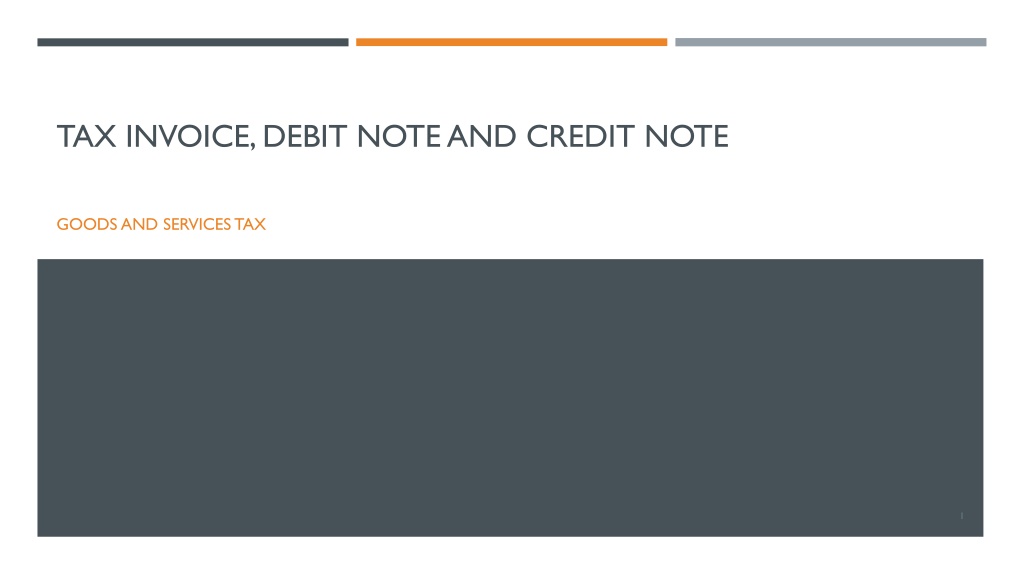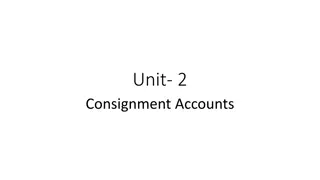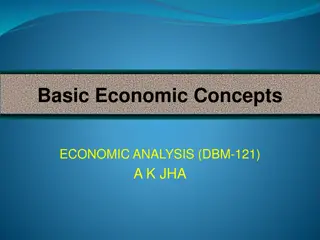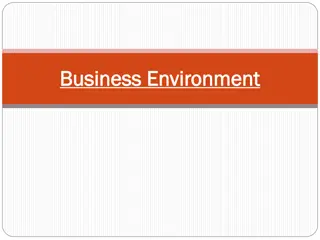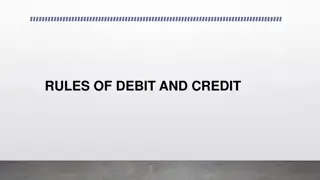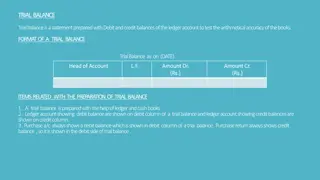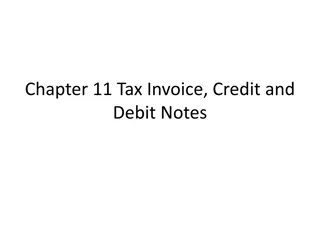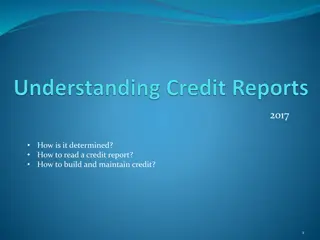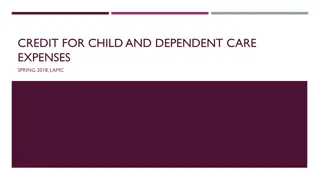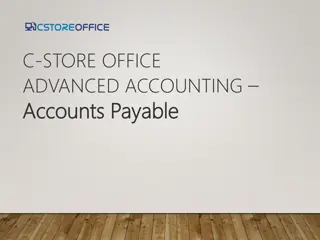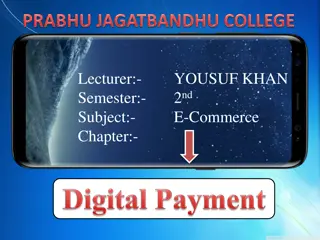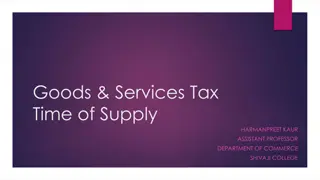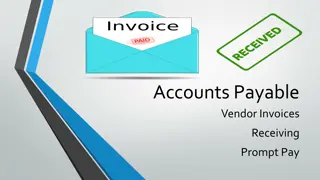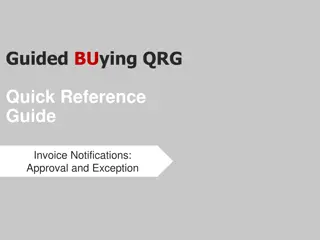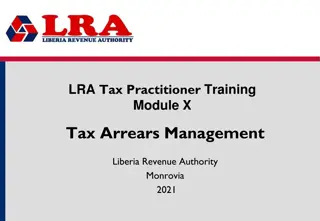Understanding Tax Invoices, Debit Notes, and Credit Notes in Goods and Services Tax
This content covers the basic concepts of supply, invoicing obligations, tax invoices under Section 28, removal of goods for supply, and scenarios where removal does not result in a supply. Learn about the different types of taxes and when tax invoices should be issued for taxable goods and services. Gain insights into the process of removal of goods, invoicing requirements, and the significance of delivery in triggering the need for a tax invoice.
Download Presentation

Please find below an Image/Link to download the presentation.
The content on the website is provided AS IS for your information and personal use only. It may not be sold, licensed, or shared on other websites without obtaining consent from the author. Download presentation by click this link. If you encounter any issues during the download, it is possible that the publisher has removed the file from their server.
E N D
Presentation Transcript
TAX INVOICE, DEBIT NOTE AND CREDIT NOTE GOODS AND SERVICES TAX 1
BASIC CONCEPTS Concept of supply supply of goods and supply of services differentiated Time and place of supply to be determined separately for goods and services Supply of goods as goods; goods as services and services as services Obligation to raise a invoice in case of supply of goods or services at different points in time: Regular supply of goods and/or services Revised invoice for period between effective date and date of certificate of registration Bill of sale Voucher for receipt of advance Receipt of goods or services from an UR person Continuous supply or goods or services Cessation of services Sent or taken on approval or sale or return basis ISD Credit or debit note or supplementary invoice Different types of taxes under Revised Model Law CGST, SGST, IGST, TDS, TCS and any cess to compensate states (not stated in the Revised Model Law) 2
TAX INVOICE (SECTION 28) Before/at the time of :- Removal of goods for supply (where supply involves movement of goods) Delivery of goods/making available to the recipient (in any other case) (Section 7(4)) Supply of taxable goods Registered taxable person shall issue tax invoice Supply of taxable services Before/after provision of service but within 30 days from the date of supply of service. Should provision be read as completion ? CG/SG may, on recommendation of council, by notification, specify the categories of goods in respect of which tax invoice shall be issued within such time as may be prescribed (45 days for banking and financial institutions including NBFCs) 3
WHAT IS REMOVAL OF GOODS? Dispatch of goods for delivery by the supplier Who can remove? Collection of goods by the recipient Supplier Any person acting on behalf of supplier Recipient Any person acting on behalf of recipient Invoicing should not be delayed till the goods destination reach Goods must be in a deliverable Mere removal goods for assembly at customers place does not become removal. statement correct ?? state; of Is this 4
REMOVAL NOT RESULTING IN SUPPLY Both the legs of Section 28 i.e., sub section (1) and (2), delivery of goods is relevant. Only if goods are for delivery then requirement to issue tax invoice is triggered Removal should always be for effecting supply. Removal of goods without supply does not require a tax invoice to be raised: Removal of goods for supply of services Eg: renting, leasing, hire, right to use goods, works contract, transfer of right in goods without transfer of title, outdoor catering Removal of goods for job work and back to principal Removal of additional goods added by job worker back to principal Removal of goods for no consideration between unrelated persons 5
TAX INVOICE (SECTION 28) A registered taxable person may within 1 month from the date of issuance of certificate of registration issue a revised invoice against invoice already issued during the period starting from the effective date of registration till the date of issuance of certificate What happens to taxes already paid by the recipient on RCM basis as purchases from UR person for such period? A registered taxable person on receipt of advance payment with respect to any supply of goods or services by him issue a receipt voucher or any other document evidencing the payment of advance Sub section (2) already requires an invoice to be issued before provision of service, presumably for advances ? Is there a conflict between the sections? A registered taxable person who is paying tax under RCM shall issue an invoice in respect of goods or services received by him on the date of receipt of goods or services from a person who is not registered under the Act. Even for receipt of services the due date is receipt of service and not 30 days from receipt of such service 6 Any other class of supplier whose goods are notified u/s 8(3) shall issue a tax invoice without tax and mention tax is payable by the recipient under RCM.
MANNER OF ISSUANCE OF INVOICE Supply of goods Supply of services Original for recipient of goods Original for recipient of goods Duplicate for transporter Duplicate for supplier Triplicate for supplier 7
INVOICE REFERENCE NUMBER Invoice reference number can be obtained from the portal by the supplier by uploading a tax invoice on the common portal in Form GST INV-1 IRN so generated shall be valid for a period of 30 days IRN can be used in lieu of duplicate copy of the invoice by the transporter (no need to carry a separate invoice) This number is sufficient for clearance at the check-posts Section 80 require the person in charge of a conveyance carrying goods of value exceeding specified limit to carry documents as may be prescribed for verification and inspection by the proper officer if intercepted 8
CONTINUOUS SUPPLY OF GOODS AND SERVICES (SECTION 2(30) & (31)) There must be a contract for supply of goods or services However, service contract the contract must be for a period exceeding 3 months The contract must be for provision or agreement provision of goods or services on a continuous or on recurrent basis The contract must envisage for: 1. Regular periodic from the supplier in case of goods and 2. Periodic payment obligations in case of service Contract Invoice / Payment Periodicity for or for a invoicing 9
INVOICE FOR CONTINUOUS SUPPLY OF GOODS AND SERVICES Continuous Supply of Services Continuous Supply of Goods before or within 30 days after the recipient is liable to pay for the services (due date of payment ascertainable from the contract) Where successive statements are involved Before/at the time of submission of statement of account before or within 30 days after receipt of payment (due date of payment not ascertainable from the contract) Where successive payments are involved At the time of receipt of payment before or within 30 days after completion of an event mentioned in the contract (payment linked to completion of an event) 10
SCENARIOS Cases Time of issuance of invoice Supply of beverage thrice a day, but payment made only on Mondays based on the statement submitted for the number of cups supplied during the previous week What if Rs.500 is paid as advance in the beginning of every week? Total amount of bill is Rs.2,500 Construction contract where the amounts will be paid on completion of plinth, 1st floor and 2nd floor Submission of statement Receipt of Rs.500 every week and Rs.500 for the balance Totally 5 bills Within 30 days of completion of each stage Cessation of manpower supply (contracted for 28 days) after 10th day On the 10th day i.e., time of cessation of services Issue of revised invoice: Separate Invoice: Registered taxable person and Inter-state supplies to unregistered persons (if value more than 250,000/-) Consolidated invoice: All taxable supplies to unregistered person Liable for registration 1st April Applied for registration 15th April Grant of registration 29th April How to collect tax for supplies made during 1st April to 28th April? 11
SPECIAL CASES ISSUANCE OF INVOICE Special Cases Cessation of supply before the completion of supply Sale on approval or sale or return basis (before it is known to be a supply) At the time of cessation and to the extent of work done till cessation. No 30 days period Before or at the time when it is known that supply has taken place 6 months from the date of removal of goods 12
IMPORTANCE OF INVOICE Revised invoice effective date of reg. till issuance of certificate of registration Document issued by ISD supply made earlier tax invoice. 30 tax amt. mentioned tax invoice or other document. Only if supply is made for a consideration 80 goods exceeds > prescribed limit carry documents (tax invoice) Availing ITC Tax invoice, debit note, suppliers invoice 13
CONTENTS OF AN INVOICE The name, address and GSTIN of the supplier, A consecutive serial number containing only alphabets and/or numerals, unique for a financial year, Date of its issue, The name, address and GSTIN/Unique ID Number, if registered, of the recipient, Name and address of the recipient and the address of delivery, along with the name of state and its code - if such recipient is unregistered and where the taxable value of supply is fifty thousand rupees or more; HSN code of goods or Accounting code of services; Description of goods/services; Quantity in case of goods and unit or Unique quantity code thereof; 14
HSN REPORT OF EMPOWERED COMMITTEE OF STATE FINANCE MINISTERS - OCTOBER 2015 HSN code (4-digit) for Goods and SAC for Services mandatory initially for all taxpayers with turnover in the preceding financial year above Rs. 5 Crore. Self declaration for first year For taxpayers with turnover between Rs 1.5 Crores and Rs 5 Crores in the preceding financial year, HSN codes may be specified only at 2-digit chapter level as an optional exercise to start with. From second year, mentioning 2-digit chapter level HSN Code will be mandatory Any taxpayer, irrespective of his turnover, may use HSN code at 6- digit or 8-digit level if he so desires To start with, compounding dealers may not be required to specify HSN at 2-digit level also SAC will be mandatory for those services for which POS are dependent on nature of services to apply the destination principle, irrespective of turnover HSN Codes at 8-digit level and Accounting Codes for services will be mandatory in case of exports and imports 15
CONTENTS OF AN INVOICE Total value of goods or services; Taxable value of goods or services taking into account discount or abatement, if any; Rate of tax (CGST, SGST, IGST); Amount of tax charged in respect of taxable goods or services (CGST, SGST, IGST); Place of supply along with the name of state, in case of a supply in the course of inter-state trade or commerce; Place of delivery where the same is different from the place of supply; Whether the tax is payable on reverse charge; The word Revised Invoice or Supplementary Invoice , as the case may be, indicated prominently, along with the date and invoice number of original invoice; and Signature or digital signature of the supplier or his authorised representative. Board/Commissioner may notify the number of digits of HSN for goods or SAC that a class of taxable person is required to mention. Also class of taxable person not required to mention the same. 16
CONTENTS OF AN INVOICE FOR EXPORT Invoice should carry an endorsement Supply meant for export on payment of IGST or Supply meant for export under bond without payment of IGST Invoice should contain: Name and address of the recipient Address of delivery; Name of the country of destination; and Number and date of application for removal of goods for export[ARE-1] 17
FORMAT 18
BILL OF SUPPLY Should be issued by a registered taxable person:- Supplying exempted goods and/or service Paying tax under Section 9 Composition scheme Period of raising BOS is same as that for tax invoice ?? If supply value is less than Rs.100/- - no need to issue BOS except when the customer wants it. Consolidated BOS each day in respect of all such supplies wherein BOS is not issued 19
BILL OF SUPPLY : CONTENTS Name, address and GSTIN of the supplier, A consecutive alpha numeric serial number, Dates of its issue, Name, address and GSTIN/ Unique ID Number, if registered, of the recipient, HSN code/Accounting code for services, Description of goods or services, Value of goods or services taking into account discount or abatement if any, and Signature or digital signature of the supplier or his authorised representative 20
ISD INPUT SERVICE DISTRIBUTOR Name, address and GSTIN of the Input service distributor; A consecutive serial number Date of its issue; Name, address and GSTIN of the supplier of service the credit in respect of which is being distributed - serial number - date of invoice issued by such supplier; Name address and GSTIN of the recipient to whom the credit is distributed; Amount of the credit distributed; and Signature or digital signature of the supplier or his authorised representative. 21
GOODS TRANSPORTATION AGENCY Gross weight of the consignment, Name of the consigner and consignee, Registration number of goods carriage, Details of goods transported, Details of place of origin and destination, GSTIN of the person liable for paying tax whether as consignor, consignee or GTA, 22 And also other information as prescribed for tax invoice.
CREDIT NOTES AND DEBIT NOTES (SECTION 31) Taxable value is more than actual taxable value When can debit notes be issued? When the taxable value is less than actual taxable value When the tax charged is less than actual tax payable Deficient supply of services made by you What warrants issue of credit notes? More tax has been charged Who is supposed to issue credit note or debit note? Only a supplier is allowed to issue a credit or debit note Supply returns 23
TIME LIMIT FOR ISSUANCE OF CREDIT OR DEBIT NOTE Time limit for issuance of credit note: Earliest of Filing return for the month of September of the next year or Filing of relevant annual return As a consequence of the above time limit, all the price revisions has to happen before the earliest of the above two dates if such price revisions are retrospective in nature to enable reduction in tax liability. Time limit for issuance of debit note: No time limit However ITC to the recipient is subject to above time limit A debit note includes asupplementary invoice. 24
CONSEQUENCES OF ISSUE OF CREDIT OR DEBIT NOTES Incidence of Tax and interest should not have been passed on to the recipient, if yes then the tax liability of the supplier shall be reduced Credit note Otherwise, tax liability of the supplier shall be reduced only to the extent of ITC reversal by recipient Tax liability or Input tax credit Once accepted by the recipient, both the tax liability and ITC shall be increased to the extent mentioned in the debit note Debit note 25
CONTENTS OF SUPPLEMENTARY INVOICE OR CREDIT OR DEBIT NOTES Name, address, GSTIN of the supplier Nature (debit or credit) of the Document Serial Number having only alphabets/numerals Date of Issue Name, and address of the recipient GSTIN/UID of the recipient, if registered Name and address of the recipient and address of delivery, along with the name of state and its code, if such recipient is unregistered Serial number and date of the corresponding tax invoice/bill of supply Taxable value of goods or services, rate of tax and the amount of tax credited/debited to the recipient Signature/Digital Signature of the Suppler or his authorised representative 26
TAX INVOICE IN SPECIAL CASES If ISD is an office of a Banking Company or a Financial Institution including NBFC; the tax invoice is deemed to include any document which may or may not be serially numbered. In case of above companies for taxable supply of services, shall issue a tax invoice or any other document in lieu thereof, by whatever name called, whether or not serially numbered, and whether or not containing the address of the recipient of taxable service but containing other information as prescribed under rule 1. In case of passenger transportation service, a tax invoice shall include a ticket in any form. The requirement of having the address of the recipient of taxable service on the tax invoice is waived. 27
Thank You For any Clarification, Please Contact Indirect Taxes Committee of ICAI Email: idtc@icai.in, Website: www.idtc.icai.org 28
